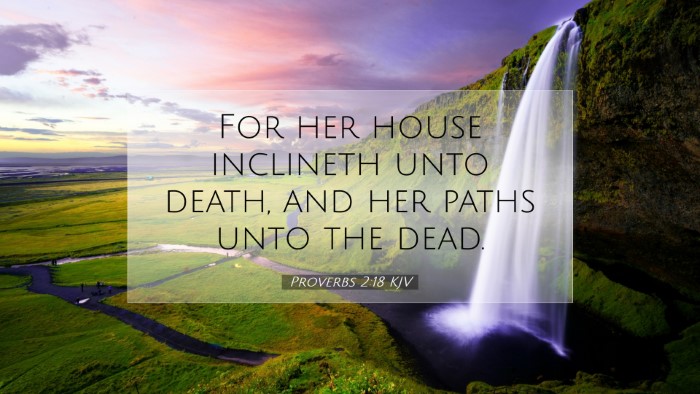Commentary on Proverbs 2:18
Verse Reference: Proverbs 2:18 - "For her house inclineth unto death, and her paths unto the dead."
Introduction
This verse is a critical warning against the dangers of immoral relationships and the seductive lure of folly. The message embedded in this proverb serves as a stark reminder for believers of the perils that accompany straying from the path of wisdom.
Understanding the Context
The book of Proverbs is a compilation of wisdom literature that emphasizes the value of wisdom, understanding, and the fear of the Lord. Solomon, regarded as the wisest of kings, compiled these sayings to teach his son and future generations about the importance of righteous living.
Literary Structure
The verse functions within a larger discourse that contrasts wisdom with folly. The "her" in this verse likely refers to the metaphorical woman representing folly, who captures the hearts of the unsuspecting. Thus, Proverbs 2:18 serves as a pivotal point in contrasting the life-giving nature of wisdom with the deadly consequences of foolishness.
Commentary Insights
1. The Nature of the Path
Matthew Henry remarks that the paths described in this verse lead to destruction. He emphasizes that the "house" symbolizes the place where folly dwells, and it is filled with temptations that ultimately lead to spiritual death. The implication is that associating with such folly can lead individuals down a path of ruin.
2. Consequences of Immorality
Albert Barnes comments on the deadly allure of seduction and the ultimate end it leads to. He notes that the "paths" of this woman are enticing but lead to spiritual death, indicating that while sin may seem pleasurable and appealing in the moment, it ultimately results in dire consequences.
He encourages readers not to be deceived by the immediate gratification that comes from immoral choices, warning that the broader outcome is eternal separation from God's grace.
3. The Symbolism of Death
Adam Clarke underscores that the "dead" in this passage symbolize not just physical death but a spiritual state of separation from God. He suggests that the wise person should avoid the influences of temptation that lead to death. Clarke eloquently states that true wisdom is found in recognizing and deliberately rejecting paths that lead one away from God’s righteousness.
Exegetical Analysis
The Hebrew term for "death" in this context refers to both physical demise and spiritual death, therefore implying that foolish decisions can lead to a total separation from the life which is found in God. The metaphor of a "house" suggests a place of comfort and security that, paradoxically, leads one to a catastrophic fate.
Implications for Life
- Awareness of Influence: Believers are called to be discerning regarding the influences they allow into their lives.
- Search for True Wisdom: The pursuit of wisdom is paramount; adhering to Biblical teachings is essential for life-giving paths.
- Guarding Against Temptation: Recognizing that folly may promise pleasure while concealing the cost of spiritual death can fortify one's resolve to remain steadfast in faith.
Application for Today
In a world saturated with distractions and immorality, Proverbs 2:18 resonates particularly with current societal challenges. Pastors, theologians, and laypersons alike are reminded of their responsibility to lead others in the pursuit of wisdom and righteousness. The warnings embedded within this verse should propel believers toward establishing a lifestyle that embraces God’s truth, not only for personal sanctification but also for the edification of the church.
Concluding Thoughts
This proverb serves as a powerful admonition to walk wisely. By understanding the grave consequences of folly and the seductive nature of sin, individuals can choose the path that leads to life. It is a call to vigilance and an urgent reminder that the pursuit of wisdom is a lifelong journey impacting not only personal lives but also the community of believers at large.


